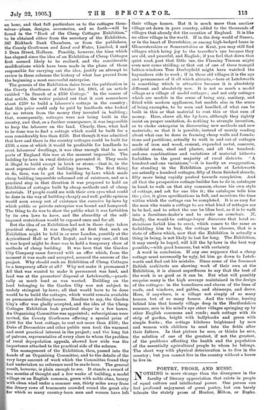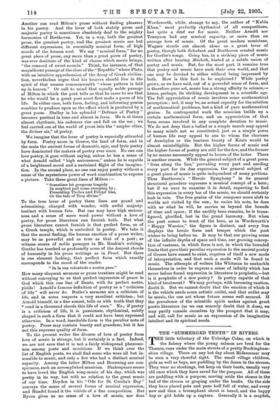Another can read Milton's prose without finding pleasure in his
poetry. And the lover of both stately prose and majestic poetry is sometimes absolutely deaf to the mighty harmonies of Beethoven. Yet, in a way, both the greatest prose, the greatest poetry, and the greatest music are but different expressions, in essentially musical form, of high moods of the human soul. We say " musical form," for no great piece of prose, any more than a great piece of poetry, was ever destitute of the kind of charm which music brings, "the concord of sweet sounds." Think, for instance, of that magnificent passage at the close of the "Republic" where Plato, with an intuitive apprehension of the decay of Greek civilisa- tion, nevertheless urges that his hearers should live in the spirit of that unseen commonwealth " whose pattern is laid up in heaven." Or call to mind that equally noble passage of Milton in which the poet tells us that he came to see that he who would be a great poet must first make a poem of his life. In either case, both form, feeling, and informing genius combine to produce upon us the effect which is produced by a great poem. Shelley in his splendid " Defence of Poetry " becomes poetical in tone and almost in form. He is at times almost rhythmic, his cadences rise and fall on the ear ; we feel carried out of the world of prose into the " ampler ether, the diviner air," of poetry.
We imagine that the lover of poetry is especially attracted by form. Poetry arose in Greece, the land of form, and in the main the ancient forms of dramatic, epic, and lyric poetry have dominated the makers of poetry ever since. No one can love poetry, it goes without saying, unless he has a sense of what Arnold called " high seriousness," unless he is capable of a heightened mood and a sustained flight of the imagina- tion. In the second place, no one can enjoy poetry without a sense of the mysterious power of word combination to express a picture. Take these great lines of Milton :- " Sometime let gorgeous tragedy In sceptred pall come sweeping by; Presenting Thebes and Pelops' line, Or the tale of Troy divine."
To the true lover of poetry these lines are grand and solemnising, charged with wonder, with awful majesty, instinct with human fate. But one may have high serious- ness and a sense of mere word power without a love of poetry, for prose literature can furnish both. But what prose literature cannot furnish is that perfect form, as of a Greek temple, which is embodied in poetry. We take it that the moral feeling, the human emotion of a prose writer, may be as powerful and as true as that of a poet ; as witness scores of noble passages in Mr. Ruskin's writings. Goethe has touched as profoundly some of the deepest chords
of humanity in his prose writings as in Faust. But there is one element lacking, that perfect form which exactly
corresponds to the mood of the reader.
" In Is sus volontade e nostra pace."
How many eloquent sermons or prose treatises might be read without conveying to us that perfect impression of peace in God which this one line of Dante, with its perfect metre, yields l Arnold's famous definition of poetry as a " criticism of life " will never do. Butler's sermons are a criticism of life, and in some respects a very excellent criticism ; but
Arnold himself, in a fine sonnet, tells us with truth that they 4` rend in a thousand shreds this life of ours." No; if poetry is a criticism of life, it is passionate, rhythmical, subtly shaped in such a form that it could not have been expressed otherwise. In a word, inevitable form is the peculiar note of poetry. Prose may contain beauty and grandeur, but it has not this supreme quality of form.
To the present writer the divorce of love of poetry from love of music is strange, but it certainly is a fact. Indeed, we are not sure that it is not a fairly widespread phenome- non among poets and musicians. If we think over the list of English poets, we shall find some who were all but in- sensible to music, and only a few who had a distinct musical capacity. Among the latter Milton and Browning are con- spicuous, each an accomplished musician. Shakespeare seems to have loved the English song-music of his day, which was pretty in its way, but with no relation to the great music of our time. Dryden in his " Ode for St. Cecilia's Day" conveys the sense of several forms of musical expression, and Handel found it the vehicle of a fine composition. But Byron gives us no sense of a love of music, nor does
Wordsworth, while, strange to say, the author of " Kubla Khan," most perfectly rhythmical of all compositions, had quite a deaf ear for music. Neither Arnold nor Tennyson had any musical capacity, or more than an average love of music. Of the great modern musicians, Wagner stands out almost alone as a great lover of poetry, though both Schubert and Beethoven created music for Goethe's songs. Grieg has, in a striking piece of music written after hearing Macbeth, hinted at a subtle union' of poetry and music. But, for the most part, it remains true that poetry and music have each their own world, and that one may be devoted to either without being impressed by both. How is this fact to be explained ? While poetry grows, as we have said, out of a powerful sense of form, and is therefore pure art, music has a strong affinity to science,— hence, perhaps, its striking development in a scientific age. The full appreciation of music involves some mathematical perception ; not, it may be, an actual capacity for the solution of mathematical problems, but a kind of pure mathematical genius. In contrapuntal work the musician builds up a certain mathematical form, and an appreciation of that form seems involved in any complete devotion to music. We do not deny that a ballad or a simple march may appeal to many minds not so constituted, just as a simple poem of human life may appeal to one to whom the choruses of Aeschylus or the luscious beauty of Keats would be almost unintelligible. But the higher forms of music and the higher forms of poetry are still for the few, and the former by no means necessarily appeal to lovers of the latter. There is another reason. While the general subject of a great poem " lives along the line," pervading every part and needing every part for its due expression, the general subject of a great piece of music is quite independent of many portions. Thus Beethoven's " Heroic Symphony " in its general structural grandeur expresses a musical concept of a hero ; but if we were to examine it in detail, expecting to find this expression in every bar of the music, we should certainly look in vain. The free genius of the composer soars aloft to worlds not visited by the sun ; he varies his note, he does with us what he will, he carries us beyond the bounds of time and space; if the earthly hero remains, he is trans. figured, glorified, lost in the grand harmony. But when the poet comes to treat of the hero, as in Wordsworth's " Happy Warrior," the figure is distinct, and every line displays the heroic form and temper which the poet wishes to bring before us. It may be that our growing sense of the infinite depths of space and time, our growing concep- tion of vastness, in which form is not, in which the bounded limits that gave their peculiar expression to the ancient poetry of Greece have ceased to exist, requires of itself a new mode of interpretation, and that such a mode will be found in music. The attempts of writers like Whitman to unshackle themselves in order to express a sense of infinity which has never before found expression in literature is prophetic,—but is it prophetic of a new poetry? Is poetry capable of that kind of treatment? We may perhaps, with becoming caution, doubt it. But we cannot doubt that the emotion of which it is the vehicle needs some artistic outlet, and that outlet may be music, the one art whose future seems well secured. If the prevalence of the scientific spirit makes against great poetic literature (as we can scarcely doubt that it does), we may partly console ourselves by the prospect that it may, and will, call for music as an expression of its imaginative intellect and its spiritual needs.
Lat. "SUBMERGED TENTH" IN RIVERS.



































 Previous page
Previous page